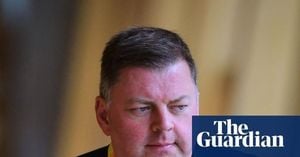The President’s Emergency Plan for AIDS Relief (PEPFAR), a cornerstone initiative of U.S. global health policy, received pivotal support from U.S. Secretary of State Marco Rubio this week. An emergency humanitarian waiver was authorized, permitting the continuation of this life-saving program aimed at combating the spread of HIV among vulnerable populations across the globe.
According to Rubio's memo released from Washington D.C., the waiver facilitates HIV treatment access for individuals across 55 countries, including Nigeria—one of the most significantly affected nations. Amid the uncertainty generated by recent policy changes under President Donald Trump's Executive Order evaluating U.S. foreign aid, the announcement has been met with relief from health advocates and organizations reliant on PEPFAR's support.
“Implementers of existing life-saving humanitarian assistance programmes should continue or resume work if they have stopped, subject to the following directions,” the memo stated. The U.S. aims to reaffirm its commitment to humanitarian efforts, particularly medical assistance, though limited by regulatory constraints on new contracts beyond the scope of this emergency measure.
Previously, PEPFAR funding faced potential suspension for at least 90 days due to the Executive Order, causing alarm for millions who depend on its support. PEPFAR, which boasts around $6.5 billion annually, currently provides treatment to more than 20.6 million individuals globally, constituting about two-thirds of all persons worldwide receiving HIV care.
The waiver delineates strict parameters, insisting on the resumption of treatment services for vulnerable groups but maintaining restrictions on family planning initiatives, gender-related programs, and any activities related to abortions. This conditionality is part of the broader ideological framework steering U.S. foreign aid policies and reflects continuing debates on public health versus political agendas.
Reacting to the waiver, Winnie Byanyima, the Executive Director of UNAIDS, expressed optimism, stating, “UNAIDS welcomes this waiver from the U.S. government which ensures millions of people living with HIV can continue to receive life-saving HIV medication during the assessment of U.S. foreign development assistance.”
Byanyima’s sentiments echo the dire reality faced by many HIV-positive individuals, particularly as Nigeria grapples with approximately two million citizens living with the virus. The country is burdened with one of the highest HIV infection rates globally, which makes PEPFAR's consistent funding and interventions central to its national health strategy.
PEPFAR's financial footprint has been significant over the years, contributing more than $6 billion to Nigeria's efforts against HIV/AIDS. This investment has been instrumental to not only save lives but also to bolster healthcare infrastructure capable of managing the overwhelming cases of HIV.
The landmark program has not only saved lives but also contributed to broader health security across regions severely afflicted by HIV/AIDS. Since its inception, it is estimated to have saved around 26 million lives, comfortably positioning PEPFAR as one of the world’s most impactful health initiatives.
The continued functioning of PEPFAR underlines America’s role as a leader in global health, particularly as international health organizations express their gratitude for the renewed commitment to assist regions most affected by health crises. By allowing the program to proceed unimpeded, Rubio emphasizes the urgency of addressing the HIV/AIDS epidemic and supporting millions impacted daily.
Despite the promising news of continued funding, challenges remain, particularly concerning the conditions imposed by the waiver, which may restrict comprehensive health initiatives targeting holistic health solutions. The rub between securing U.S. funding and adherence to prescribed ideological standards presents potential hurdles for NGOs and implementing agencies.
With such pivotal moments for global health strategies, the hope is for more inclusive policies moving forward, balancing necessary moral viewpoints with the undeniable need for humanitarian intervention. Health advocates remain vigilant, advocating for progressive policies and sustainable funding as they navigate the complex maze of international health governance.
While the waiver serves as temporary relief for those depending on PEPFAR’s medication and support networks, the call for unimpeded access to comprehensive healthcare continues to resonate strongly across affected communities. For now, the message is clear: the fight against HIV/AIDS must persist, fortified by unwavering commitments to provide aid and medical assistance to those who need it most.



